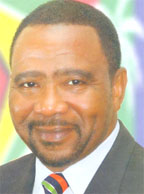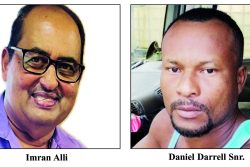PNCR leader Robert Corbin will be seeking re-election as head of the main opposition, a senior party executive says.
According to Central Executive Member Amna Ally, Corbin “will be contesting the leadership” when the party’s Biennial Congress is held later in the year. Ally made the announcement to supporters at the PNCR’s Berbice District Conference over the weekend and confirmed it yesterday when contacted by Stabroek News, saying it was “a fact.”

Corbin, who recently underwent surgery overseas for an undisclosed medical condition, had left open the possibility about his candidacy when asked at the start of the year. He said that the question of his “electability” is for the judgement of members and supporters, who will decide the direction of the party at the Congress.
Already, management consultant Dr. Aubrey Armstrong as well as former Health Minister Dr Richard Van West-Charles have indicated an interest in contesting for the party leadership at the Congress. Armstrong, a PNCR executive, had not made a decision at the start of the month but did not rule out the possibility; while Van West-Charles has been open about candidacy.
Corbin has continued to face down questions about his leadership as well as calls for him to step down since the 2006 general elections, where the party recorded its worst election defeat. Recently, the PNCR has been criticised for taking a soft approach to the government, raising doubts about whether it was providing effective leadership of the opposition. Acknowledging the need to retool and restructure, the party held a leadership retreat at the start of the year where it identified several areas for attention, including how it is financed, its use of technology, its outreach to its membership as well as its outreach to youth and to non-traditional supporters, particularly in the Indo-Guyanese and Amerindian communities.
Corbin declared at the 2007 Congress that the PNCR would not have progressed in its goal to reform itself if the leadership featured the same faces by its next congress. He said earlier this year that the party should be moving to build a new cadre of leadership. “Many of us have been there for a long time,” he explained, “We believe it is time for us to be handing over this party to a reinvigorated, revitalised group so that they could take the party forward.”
On the question of his electability, he insisted that it was for the judgement of party membership and supporters and refused to divulge his own feelings on the matter. However, he sought to debunk the notion that the party leader is the sole person responsible for formulation and execution of policy, noting that there is leadership at several levels. “It is a mistake to think that any one person could change or direct the affairs of the party,” Corbin said. “Even if the membership decides at the next congress to have another leader, that leader would have the same constraints and scope.”
The PNCR has experienced internal turmoil, including the departure of a number of high profile members and supporters, including almost all of the founders of its Reform component. More recently, last year former party vice-chairman Vincent Alexander and supporters of his campaign for leadership withdrew their membership, citing several concerns, including the recall of MP James McAllister. (Alexander and supporters had waged an unsuccessful challenge to Corbin’s leadership.) Additionally, Winston Murray gave up the post of Chairman on a matter of principle though he has remained a Member of Parliament and the party’s shadow finance minister. (Andre Haynes)





